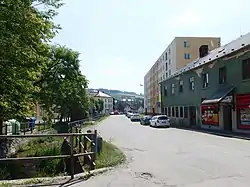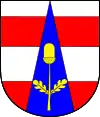Brněnec
Brněnec (German: Brünnlitz) is a municipality and village in Svitavy District in the Pardubice Region of the Czech Republic. It has about 1,300 inhabitants.
Brněnec | |
|---|---|
 Main street | |
 Flag  Coat of arms | |
 Brněnec Location in the Czech Republic | |
| Coordinates: 49°37′39″N 16°31′19″E | |
| Country | |
| Region | Pardubice |
| District | Svitavy |
| First mentioned | 1557 |
| Government | |
| • Mayor | Blahoslav Kašpar |
| Area | |
| • Total | 6.30 km2 (2.43 sq mi) |
| Elevation | 370 m (1,210 ft) |
| Population (2020-01-01[1]) | |
| • Total | 1,259 |
| • Density | 200/km2 (520/sq mi) |
| Time zone | UTC+1 (CET) |
| • Summer (DST) | UTC+2 (CEST) |
| Postal code | 569 04 |
| Website | obec |
Administrative parts
Villages of Chrastová Lhota, Moravská Chrastová and Podlesí are administrative parts of Brněnec.
History
Next to an old trade route, the settlement of Moravská Chrastová was founded after 1200 by monks from a monastery in Litomyšl. Moravská Chrastová was first mentioned in a document from 1323. The first written mention of Brněnec is to be found in the 1557 act of partition of the dominion of Swojanow. Until the 18th century it was a part of Bělá nad Svitavou.[2]
In 1892, workers carrying out improvements to the Bělá nad Svitavou road stumbled upon the remnants of prehistoric clay jars in the vicinity of the Nová Amerika inn, one kilometre west of Brněnec. Systematic excavation on this site in 1893 unearthed further archaeological finds. A neighbouring hillside of crevices and caves, known as Jeskyně Čertovy, had already yielded traces of earlier settlements.
Until 1918, Brněnec was part of the Austrian empire (Austria side after the compromise of 1867), in the Polička District, one of the 94 Bezirkshauptmannschaften[3] in Bohemia. A post-office was opened in 1869.
With the construction of the railway from Prague to Brno (before 1850?), Brněnec received its own railway station on this main line. This encouraged numerous new industrial enterprises such as textile factories to develop around the dominant business of the Daubek mills.
In 1930, the municipality of Brněnec (including the then parts of Zářečí nad Svitavou, now part of the municipality of Březová nad Svitavou, and Podlesí counted 606 inhabitants, of whom 208 held German nationality. In 1939, as a result of German occupation and the ensuing retreat of Czech inhabitants, the total population had dropped to 490.
The municipality extended at that time only to the Bohemian right bank of the river Svitava. On the opposite Moravian bank was the independent municipality of Moravská Chrastová, which, together with its administrative parts of Chrastová Lhota and Půlpecen (now part of the municipality of Chrastavec), had a total population in 1939 of 1,143 inhabitants and was therefore twice the size of Brněnec.
The town of Brněnec formed part of the administrative and judiciary region of Politschka. After the annexation of the Sudetenland by Germany, it was integrated into the county of Zwittau.

In 1944, Oskar Schindler relocated his German Enamelware Factory and the associated prison camp of 1,200 Jewish forced labourers from Kraków to a munitions factory acquired by him in Brněnec. The Jewish workforce thus escaped transport to the extermination camps and was liberated along with the rest of the municipality on 10 May 1945 by the Red Army, after the factory had been fully operational for seven months. The Endowment Fund for the Memorial of the Shoah and Oskar Schindler is currently engaged in turning the ruins of the factory into a museum.[4]
The factory
History of the factory:[5]
- 1840s: The Low-Beer Jewish family moved into the area. They set up the factory, making high-quality textiles.
- 1938: The Germans occupied Czechoslovakia. The Low-Beer family fled to Britain. Germans took over the factory.
- 1944: Oskar Schindler brought his Jews to Brněnec and started to work the factory.
- May 1945: Russians liberated Brněnec. Afterwards, the Communist government of Czechoslovakia nationalized the factory.
- 1989: Fall of Communism. The factory went into private hands. In its last years the factory made car seat covers and airline blankets. Its last general manager was František Olbert.
- 2010: The factory closed and was left abandoned. Afterwards, thieves stripped out much of its wood and metal.
- 2017: The local government of Brno invited the Low-Beers to come back to the area. František Olbert approached Daniel Low-Beer.
- Daniel Low-Beer works for the World Health Organization in Geneva and runs the Ark Foundation, which owns the factory. There is a plan to turn the derelict factory into a museum called Schindler's Ark.
Notable people
- Oskar Schindler (1908–1974), World War II-era industrialist who saved 1,200 Jewish lives
References
- "Population of Municipalities – 1 January 2020". Czech Statistical Office. 2020-04-30.
- "O obci/Historie" (in Czech). Obec Brněnec. Retrieved 2020-11-01.
- Die postalischen Abstempelungen auf den österreichischen Postwertzeichen-Ausgaben 1867, 1883 und 1890, Wilhelm Klein, 1967
- Day, Matthew (17 August 2016). "Czech factory once home to 1,200 Jews saved by Oskar Schindler to be turned into a Holocaust museum". The Telegraph. Retrieved 7 September 2016.
- Day, Matthew (24 February 2019). "British descendant of Schindler factory owner to turn derelict building into museum". The Sunday Telegraph. p. 13.
External links
 Media related to Brněnec at Wikimedia Commons
Media related to Brněnec at Wikimedia Commons- Microregion Brněnec (in Czech)